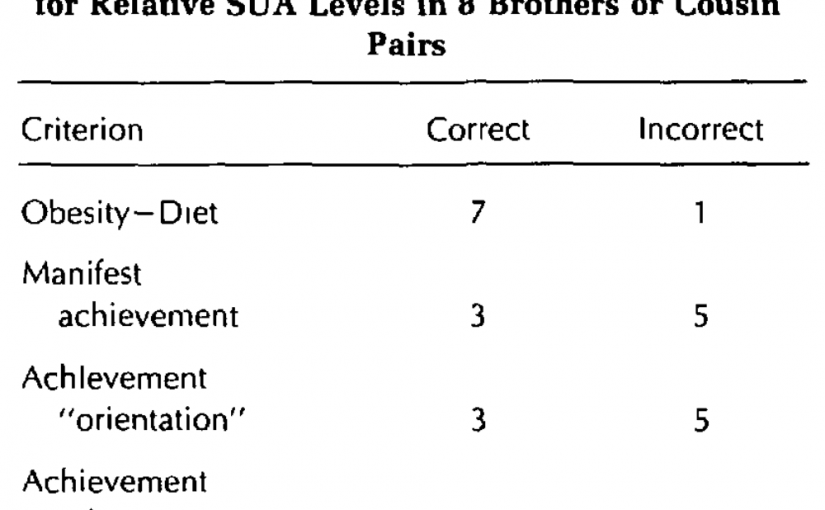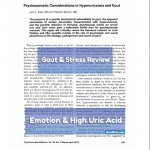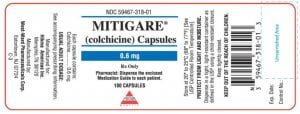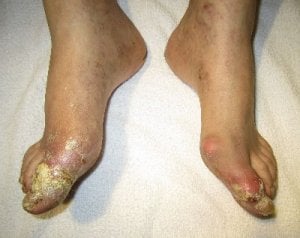Stress and Gout follows up my review of the 1972 Gout and Stress report. Specifically, it reviews science that suggests stress-induced behavior changes might affect gout and uric acid.
Stress and Gout Audience
I wrote Stress and Gout mainly for Secondary Gout Sufferers. That is gout sufferers who suspect their gout is caused by a treatable secondary disease or other health problem. In this case, I explain emotional issues that are thought by many to cause gout attacks. However, the information is also useful to other types of gout sufferer who might consider stress-reduction. If you are new to GoutPal, you should read Questions for Gout Sufferers first.
Stress and Gout
In Stress and Gout, I continue from Katz and Weiner’s 1972 report. With Katz’s tribute to Weiner on his retirement in 1982[*]. Then, I review 2 more recent reports about stress and gout.
Katz’s report deals with 3 main diseases. But, I will only review the section about effects of stress and anxiety on gout. The previous report ended with hope that more research would “shed more light” on stress and gout. So, Katz reviews relevant research.
Stress and Gout Report
First, he explains the difficulties of modeling emotional disorders with respect to any disease. Because the disease needs a measurable factor. So, with gout, we have a very easy-to-measure factor – uric acid. But, that still raised questions:
- Why does gout only affect a small percentage of people with high uric acid?
- Why does gout come and go?
Clearly, these questions are vital to understanding links between stress and gout. Because, if gout appears to be random, it is impossible to link it directly to stress, or anything else.
Emotional Stress and Gout
Firstly, Katz reminds us, from the previous report, that gout sufferers are often ambitious high-achievers[16]. Also, there are several studies that link uric acid with:
- Academic seniority.
- Achievement.
- College completion.
- Executive level.
- Intelligence.
- Leadership.
Then, other studies showed statistical links between emotions, including stress, and uric acid. But, none involved gout sufferers. Also, there was nothing to explain how emotional tension might increase uric acid.
Can Stress Cause Gout?
Next, Katz and Weiner undertook specific psychiatric investigations into people with high gout risks[17]. In this study, they analyzed 4 factors for links with increase uric acid:
- Obesity level / dietary content.
- Manifest achievement.
- Achievement orientation.
- Achievement drive.
However, results showed that the only reliable indicator for gout was obesity. Because none of the achievement factors indicated links that were better than chance.
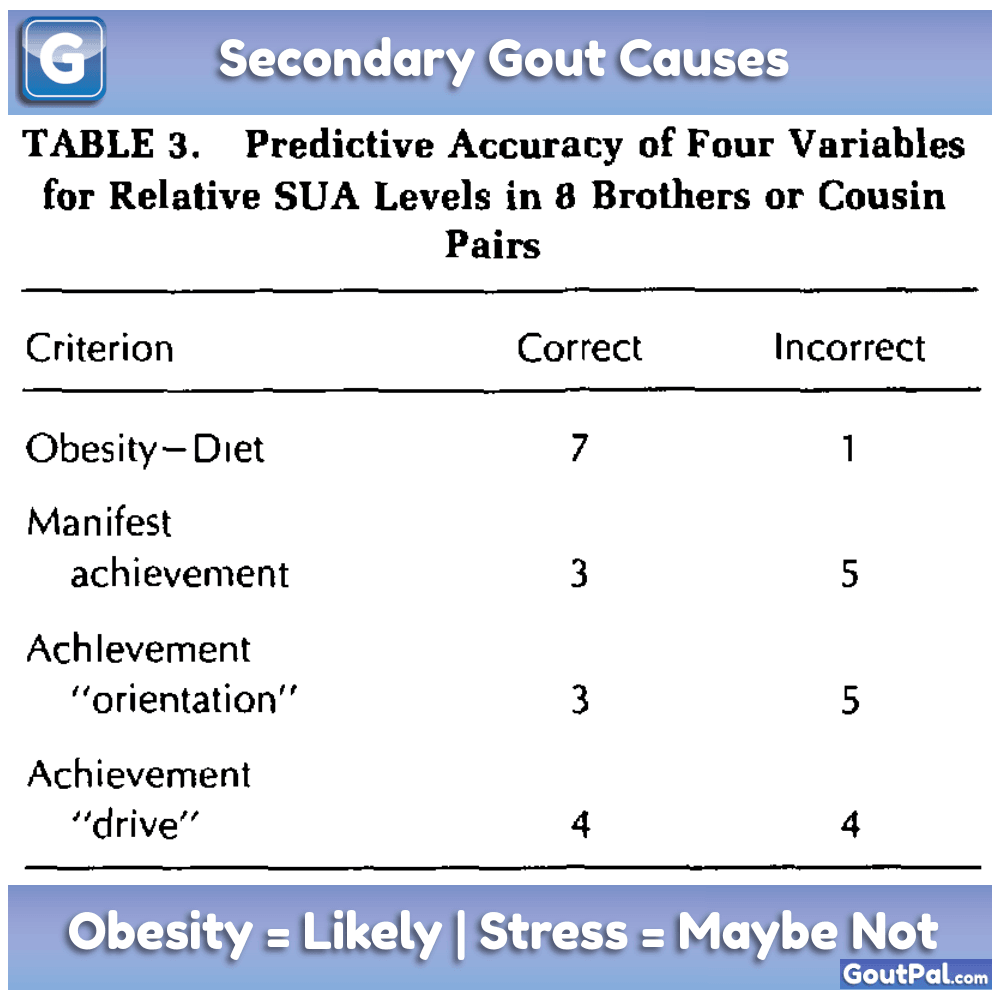
Then, Katz makes lengthy notes about potential explanations. But, in reality, such explanations are educated guesswork. Also, Katz compares gout sufferers to the rest of the population. Because these groups have different patterns of changes in uric acid. Subsequently, they decided to investigate a group of confirmed gout sufferers.
Stress and Gout Attacks
In their 1975 investigation, Katz and Weiner interviewed 16 gout patients about stress and gout[20]. Significantly, over half the subjects linked episodes of gout to periods of tension.
However, when questioned in depth, subjects revealed that their behavior changed significantly during periods of stress. Katz notes several specific examples of subjects who became stressed in some work situations. But, as well as stress, these situations also involved changes in eating habits, more alcohol, and more time standing. So, Katz concludes:
Before making assumptions about any direct effect of [stress on gout, we should look at behavior] such as changes in food and alcohol intake, medication conformance, activity level, sleep routine, etc.
Stress and Gout Conclusion
With over 30 years since Weiner and Katz investigated stress and gout. I looked for more recent developments. To date, I found 2 that acknowledge Katz and Weiner’s 1972 report. But, neither seem to acknowledge stress-related behavior changes.
Firstly, I looked at Lorenzi, T. M., et al. Association of serum uric acid levels with emotional and affective temperaments. Journal of affective disorders 121.1 (2010): 161-164. Lorenzi brings new psychological methods for assessing temperament to this investigation and concludes:
serum uric acid seems to be a biochemical marker of temperament both in males and females. Its role as a cause or consequence of externalized emotions and behaviors remains to be established, but the therapeutic effects of uric acid lowering treatment in externalized disorders suggest at least a contributing role in some patients. These results also add a pathophysiological basis for the use of uric acid lowering drug allopurinol as a psychiatric treatment for externalized disorders.
Unfortunately, this ignores the later work of Katz and Weiner. Because there is no apparent consideration of those important behavior changes. However, there is some merit in investigating the use of allopurinol for stress-related disorders.
Secondly, I looked at Armon, Galit. “Serum uric acid and the Five Factor Model of personality: Implications for psychopathological and medical conditions”. Personality and Individual Differences 97 (2016): 277-281. Again, the authors appear to ignore changes in behavior. Unfortunately, I can only base this on the abstract:
Extraversion was associated with elevated SUA at T1 and T2. Conscientiousness was associated with decreased SUA at T1. The associations of Extraversion and Conscientiousness with SUA decreased to marginal significance when adjusted for body weight as a possible mediator. Agreeableness was associated with decreased SUA at T1 and T2 and persisted after adjustment for covariates.
Therefore, it might be beneficial to do more research. Because the investigation indicates that Agreeableness is associated with decreased uric acid.
In conclusion, when we investigate stress and gout, we must be careful to allow for changes in behavior when stressed. Also, we need to be careful to look at other potential factors. Because we know that obesity is more than likely to cause secondary gout (so see Gout and Obesity – Avoid Excess Calories. Whereas, stress is unlikely to cause secondary gout.
Stress and Your Gout
After my review of earlier investigations, I recommended you should see a specialist if you suffer from stress. That advice remains, as does my advice to keep a diary of stress symptoms and gout symptoms. However, when you record your stress symptoms, try to include changes in your behavior.
Finally, with current knowledge, the most likely explanation for a link between stress and gout is down to other factors. Of course, that still means the link is valid for an individual. Because if you associate your stress with gout, you must do something about it. Therefore, reducing your stress may help you avoid the behavior that might cause gout.
Remember that, although GoutPal is about gout, you might get personal help in the gout forum. Because other stress and gout sufferers might help you cope with yours.
Leave Stress and Gout to browse more Secondary Gout Plan Step 5 Resources.
Stress And Gout Comments
GoutPal visitor responses include:
Can Stress Trigger Gout?
Unfortunately, gout triggers are a very complex topic. Because uric acid crystals might cause gout attacks when they are forming and when they are dissolving. So how do you know exactly how stress might affect your gout? Stress might be one of the triggers for gout. But it is very hard to know – and more stressful to worry about! So talk to your doctor about getting uric acid safe. Then you can stop worrying about gout.
Gout, Stress, & Anxiety
Carlos asked me if his anxiety and gout are linked.
The more I think about gout, the more anxious I get. I’m confused if gout causes stress or if stress causes gout. I’m trying not to feel overwhelmed. But which is most important – anxiety or gout?
Gout, Anxiety, Depression, & Mental Health
I responded that I see similarities between stress and uric acid. Because both are part of life. But when uric acid goes higher than our body can cope with we get gout. When stress goes higher than our mind can cope with we get anxiety, depression, and/or other mental health disorders. For links between these conditions, I have some more research that I will share when I complete it. But you need action, not worry.
In both cases you have to consult with health professionals to formulate a recovery plan. Because worrying will not help.
Stress and Gout References
* This is a review of:
- Author:
- Katz JL.
- Title:
- Three Studies in Psychosomatic Medicine Revisited: A Tribute to the Psychobiological Perspective of Herbert Weiner.
- Published:
- Psychosom Med. 44(1):29-42 April 1982.
The following list of references are from the original report. However, I have omitted references that I have not referred to in my review, above.
- 16. Katz JL, Weiner H: Psychosomatic considerations in hyperuricemia and gout. Psychosom Med 34:165-182, 1972.
- 17. Katz JL, Weiner H, Gutman A, Yu TF: Hyperuricemia, gout, and the executive suite. J Amer Med Assoc 224:1251-1257, 1973.
- 20. Katz JL, Weiner H, Yu TF: Psychobiological variables in the onset and recurrence of gouty arthritis: A chronic disease model. J Chron Dis 28:51—62, 1975.
Please give your feedback
Did this page help you? If yes, please consider a small donation. Your donations help keep GoutPal's gout support services free for everyone.
If not, please tell me how I can improve it to help you more.
- YouTube
- The gout forums.
